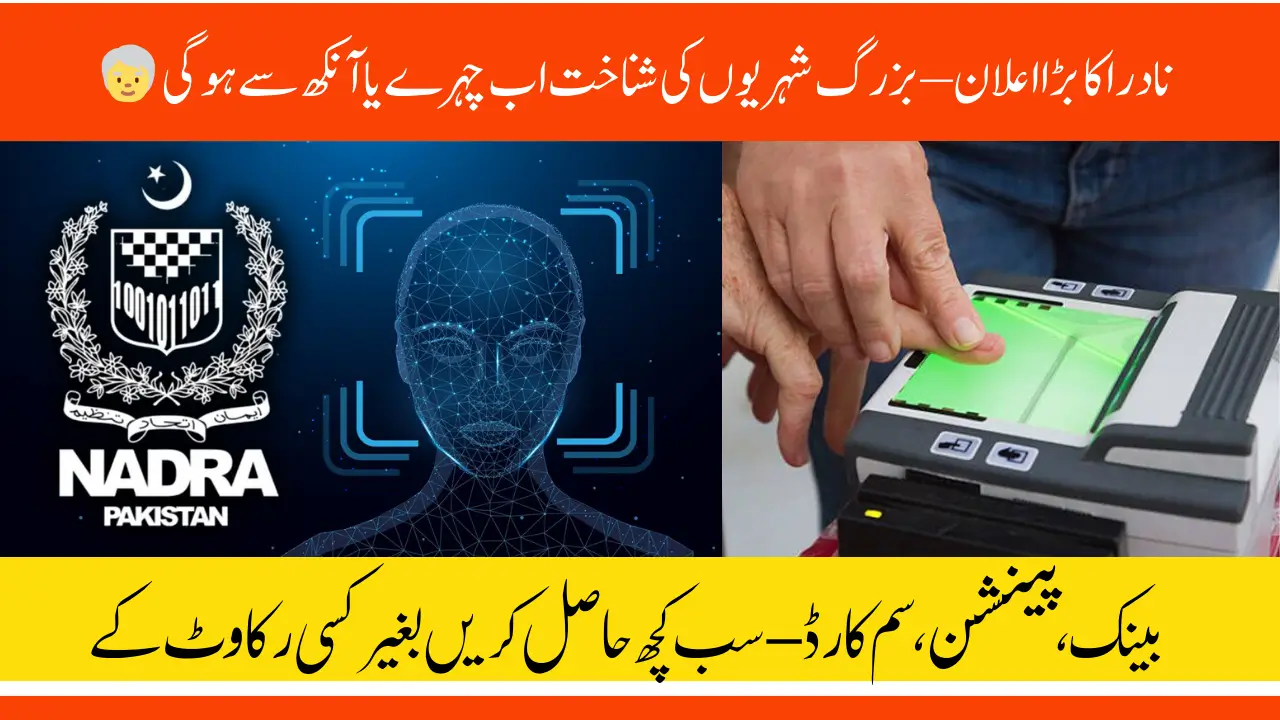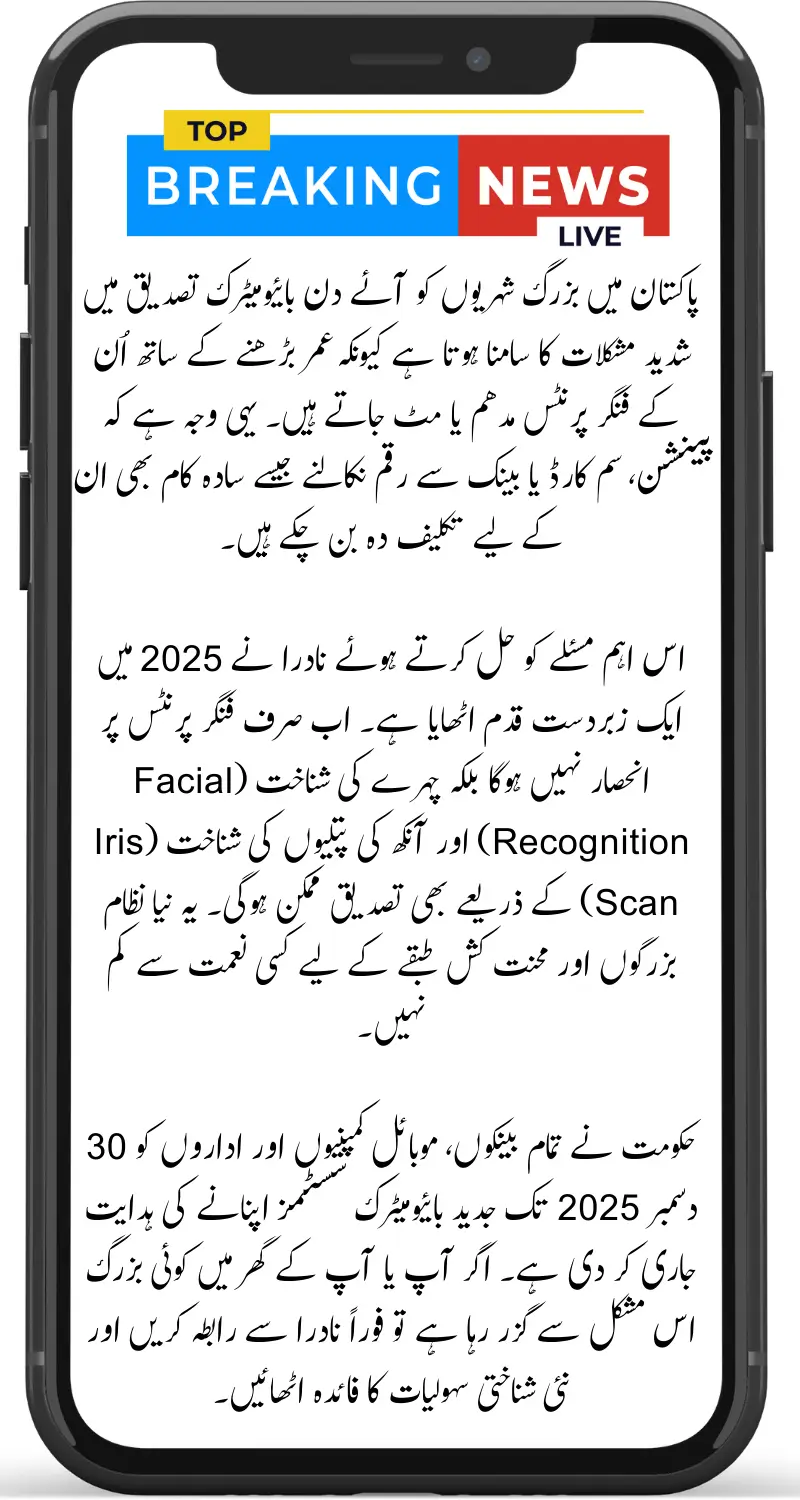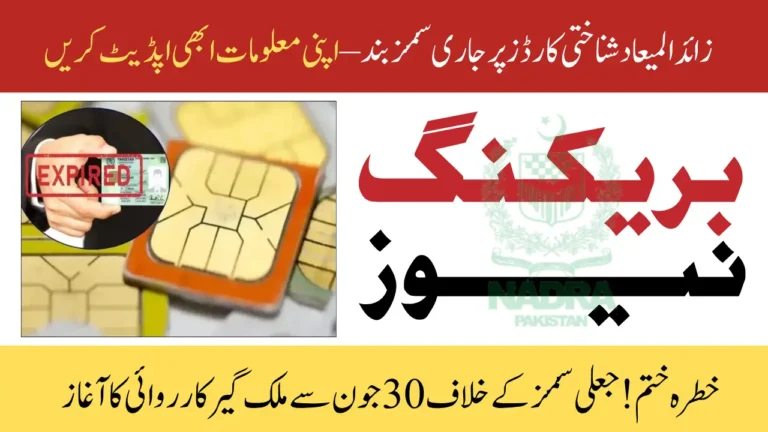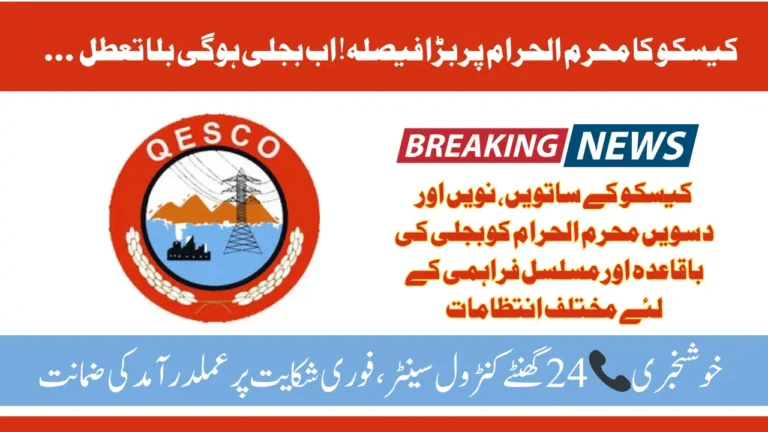
NADRA New Biometric Rules 2025
NADRA New Biometric Rules 2025 especially for Senior citizens in Pakistan face serious difficulties in biometric verification day by day because their fingerprints fade or disappear with age. This is why even simple tasks like pensions, SIM cards or withdrawing money from the bank have become painful for them.
To solve this important problem, NADRA has taken a huge step in 2025. Now, there will be no reliance on fingerprints alone, but verification will also be possible through facial recognition and iris scan. This new system is no less than a blessing for the elderly and the working class.

The government has issued instructions to all banks, mobile companies and institutions to adopt modern biometric systems by December 30, 2025. If you or any elderly person in your family is going through this difficulty, then contact NADRA immediately and take advantage of the new identification facilities.
Read More: Urgent BISP Fake Messages Alert: Why Only Trust 8171 & Avoid Scams
Real-Life Problem: The Story of Qaiser Ahmed
Take the example of Qaiser Ahmed, a 62-year-old resident of Rawalpindi. Due to aging skin, his fingerprints have become unrecognizable, making it difficult for him to receive his pension, get a new SIM card, or conduct simple banking transactions.
Despite visiting NADRA offices and bank branches repeatedly, he continues to face rejection due to biometric mismatches. He is just one among thousands affected by this issue.
Why Do Fingerprints Fade with Age?
As a person gets older, the skin on their hands undergoes structural changes. The fingerprint ridges become faint due to wrinkles, skin dryness, and overall thinning.
Those who worked manual labor jobs throughout their lives, like farmers, tailors, or factory workers, are even more vulnerable as their fingerprint patterns often wear off due to years of physical activity.
What Is NADRA’s Official Solution in 2025?
In response to these challenges, NADRA has made a historic update to its biometric verification system. According to its official spokesperson, the National Identity Card Rules 2002 have now been amended. This change includes the addition of facial recognition and iris (eye) scanning as valid alternatives to fingerprints for biometric verification.
Read More: CM Punjab Ration Card for Suthra Punjab Workers: Eligibility List, Attendance Record & Rollout Plan
New Biometric Rules: Facial and Iris Recognition Introduced
Now, if someone’s fingerprints are not scannable, they can be verified using:
- Facial recognition technology
- Iris scanning (eye-based verification)
This means citizens will no longer be solely dependent on their fingerprints to confirm their identity. NADRA is now leading the way to make the biometric process more inclusive, especially for the elderly and those with worn-out fingerprints.
Deadline for Full Implementation of New System
The Ministry of Interior has given all related departments until 30th December 2025 to fully implement these new biometric standards. By this date, banks, telecom companies, and all other identity-verifying institutions must adopt facial and iris verification systems.
Who Has Been Instructed to Upgrade Devices?
NADRA has officially informed the following key institutions:
- Pakistan Telecommunication Authority (PTA)
- Federal Investigation Agency (FIA)
- State Bank of Pakistan (SBP)
- Securities and Exchange Commission of Pakistan (SECP)
- All commercial banks and telecom companies
They are instructed to replace outdated fingerprint-only devices with modern multi-biometric systems that include facial and iris scanning capabilities.
What Should Citizens Do If Fingerprints Are Not Recognized?
If your fingerprints are not being accepted:
- Visit the nearest NADRA registration center and report the issue.
- Request for biometric update using facial or iris recognition.
- If still rejected, contact your bank or service provider and mention the new NADRA rule.
- Keep checking with updated branches that have facial recognition-enabled devices.
Role of Banks, Telcos & Government Offices
While NADRA provides the biometric database and technology, implementation depends on each institution’s compliance. State Bank of Pakistan has already instructed all banks to upgrade their biometric verification systems. Similarly, PTA is expected to ensure that all mobile operators offer facial recognition as an alternative during SIM issuance.
Read More: Kisan Card Revolution Hits Mandi Bahauddin: Over 10,000 Farmers Benefiting in Phase 1
What If Institutions Don’t Comply? NADRA’s Response
NADRA has clarified that while it provides technical assistance and updated systems, regulatory compliance is the responsibility of sector regulators like SBP and PTA. If any bank or telecom company fails to offer alternatives, it should be reported to the respective regulator for follow-up.
Frequently Asked Questions – NADRA Biometric Update 2025
What should I do if my fingerprints are not working anymore?
Visit your nearest NADRA center and request verification using facial recognition or iris scanning. These are now valid alternatives to fingerprints.
Why do fingerprints stop working with age?
As we grow older, the skin becomes thin and dry. This makes fingerprints faint or unrecognizable especially for those who did manual labor throughout life.
What new biometric methods has NADRA introduced?
NADRA now allows facial recognition and iris scanning for identity verification alongside fingerprints.
When will these new rules be fully implemented?
All banks, telecom companies, and institutions must adopt the new system by 30th December 2025.
Who must upgrade their biometric devices?
Institutions like banks, telecom companies, PTA, SBP, and SECP have been instructed to upgrade to multi-biometric systems.
What if a bank or SIM company doesn’t accept anything except fingerprints?
You can report them to their regulator (like SBP for banks or PTA for telecom companies) as they are now required to support new methods.
Read More: BISP 8171 Added Districts July 2025 Women on Waiting List Can Now Receive Payments
Summary
The introduction of facial and iris biometric verification marks a revolutionary step in ensuring digital inclusion for all, especially the elderly and labor-class citizens who face challenges with fingerprint recognition. This new system will reduce the hurdles in receiving pensions, bank services, and SIM cards.
Citizens are encouraged to spread awareness and help affected family members get updated through NADRA’s new protocols. By December 2025, Pakistan will move one step closer to a fairer and more inclusive digital verification system for everyone.





